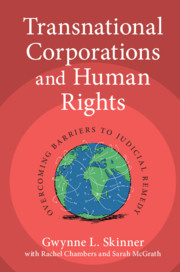Book contents
- Transnational Corporations and Human Rights
- Transnational Corporations and Human Rights
- Copyright page
- Dedication
- Dedication
- Contents
- Foreword
- Abbreviations
- Table of Cases
- Table of Statutes
- Introduction
- Part I Rise of Transnational Corporations, Impact on Human Rights, And Victims’ Rights to Remedy
- 1 Growth and Structure of TNCs
- 2 Victims’ Rights To Remedy for Business-Related Human Rights Violations
- 3 Barriers to Judicial Remedies in Host Countries
- 4 Limits on Subject Matter Jurisdiction over International Human Rights Violations
- 5 Limited Liability of Parent Corporations
- 6 Lack of In Personam Jurisdiction over TNCs and their Affiliates
- Part II Legal Barriers to Remedy and How to Overcome Them
- Conclusion
- Select Bibliography
- Index
6 - Lack of In Personam Jurisdiction over TNCs and their Affiliates
from Part I - Rise of Transnational Corporations, Impact on Human Rights, And Victims’ Rights to Remedy
Published online by Cambridge University Press: 04 September 2020
- Transnational Corporations and Human Rights
- Transnational Corporations and Human Rights
- Copyright page
- Dedication
- Dedication
- Contents
- Foreword
- Abbreviations
- Table of Cases
- Table of Statutes
- Introduction
- Part I Rise of Transnational Corporations, Impact on Human Rights, And Victims’ Rights to Remedy
- 1 Growth and Structure of TNCs
- 2 Victims’ Rights To Remedy for Business-Related Human Rights Violations
- 3 Barriers to Judicial Remedies in Host Countries
- 4 Limits on Subject Matter Jurisdiction over International Human Rights Violations
- 5 Limited Liability of Parent Corporations
- 6 Lack of In Personam Jurisdiction over TNCs and their Affiliates
- Part II Legal Barriers to Remedy and How to Overcome Them
- Conclusion
- Select Bibliography
- Index
Summary
Another barrier to remedy for victims of human rights abuses is that courts may lack jurisdiction over the defendant in the case. As a threshold matter, for a court to adjudicate a case, it must have jurisdiction over the person who is the defendant, known as in personam jurisdiction, or personal jurisdiction. Almost always a court will have personal jurisdiction over an entity (a parent, subsidiary, or other entity) if it is domiciled or incorporated in the court’s country. Thus, if a victim of a human rights abuse can bring a claim against the corporate entity involved the harm in the country where the victim lives and the harm occurs, because the entity is domiciled or headquartered there, personal jurisdiction usually exists and will not typically pose a barrier to remedy. Similarly, if a victim is able to bring a claim for extraterritorial harm against the parent company in the parent company’s domicile or country where they are headquartered (either because they can “pierce the corporate veil” or because of the availability of an alternative theory allowing the victim to sue the parent), personal jurisdiction typically will not present a problem. Unfortunately, and as discussed above, in the high-risk countries and industries where human rights abuses take place, these situations are comparatively rare. Either the host country does not permit the cause of action, or there is no ability to pierce the corporate veil, or there is another barrier to suit. However, where a victim attempts to sue an entity, whether a parent, subsidiary or other entity, in a country that allows a cause of action for the harm but is not the country of legal domicile, personal jurisdiction may pose an insurmountable obstacle. For example, due to barriers in their own country, a victim might try to seek damages against an offending entity, such as a subsidiary, in the country where its parent is located; similarly, a victim may try to seek damages against a parent company that was involved in the abuse where it conducts substantial business, has offices, or operates through a subsidiary or subsidiaries. It is in these situations, where the country may well provide a cause of action that would allow the victim to bring a claim, that courts might find they do not have personal jurisdiction over the proposed defendant entity, and thus cannot adjudicate the case.
- Type
- Chapter
- Information
- Transnational Corporations and Human RightsOvercoming Barriers to Judicial Remedy, pp. 52 - 62Publisher: Cambridge University PressPrint publication year: 2020

